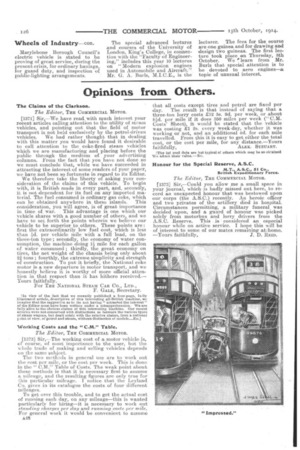Opinions from Others.
Page 16

If you've noticed an error in this article please click here to report it so we can fix it.
The Claims of the Clarkson.
The Editor, THE COMMERCIAL MOTOR.
[1371] Sir,—We have read with much interest your recent articles calling attention to the utility of steam vehicles, and pointing out that the field of motor transport is not held exclusively by the petrol-driven vehicles. We had rather thought that in dealing with this matter you would have found it desirable to call attention to the coke-fired steam vehicles which we are manufacturing and placing before the public through the medium of your advertising columns. From the fact that you have not done so we must conclude that, while we have succeeded in attracting the interest of some readers of your paper, we have not been so fortunate in regard to its Editor.
We therefore tale the liberty of asking your consideration of the claims of this vehicle. To begin. with, it is British made in every part, and, secondly, it is not dependent for its fuel on any imported material. The fuel consumed is ordinary gas coke, which can be obtained anywhere in these islands. This consideration, you will agree, is of great importance in time of war. This advantage is one which our vehicle shares with a good number of others, and we have to set forth the points wherein we believe our vehicle to be superior to others. These points are: first the extraordinarily low fuel cost, which is less than 1-d. per vehicle mile with a full load, on the three-ton type; secondly, the economy of water consumption, the machine doing 1 mile for each gallon of water consumed ; thirdly, the great economy on tires, the net weight of the chassis being only about 2i torts; fourthly, the extreme simplicity and strength of construction. To put it briefly, the National coke motor is a new departure in motor transport, and we honestly believe it is worthy of more official attention in that respect than it has hithero received.— Yours faithfully.
For THE NATIONAL STEAM CAR CO., LTD., F. GALE, Secretary.
[is view of the fact that we recently published a four-page, fully illustrated article, descriptive of this interesting all-British machine we imagine that the suggestion as to its not having " attracted the interest' of the Editor must have been written under a misapprehension. We are fully alive to the obvious claims of this interesting machine. Our recent articles were not concerned with distinctions as between the various types of steam wagons, but dealt solely with the relative claims, from a national joint of view, of petrol and steam, without distinotion of models—ED.]
Working Costs and the "C.M." Table.
The Editor, THE COMMERCIAL MOTOR.
[1372] Sir,—The working cost of a motor vehicle is, of course, of most importance to the user, but the whole trade of making and selling vehicles depends on the same subject.
The two metheds in general use are to work out the cost per mile, or the cost per week. This is done
in the " CAL" Table of Costs. The -weak point about these methods is that it is necessary first to assume
a mileage, and the resulting figures are only true for this particular mileage. I notice that. the Leyland Co. gives in its catalogue the costs of four different mileages.
To get over this trouble, and to get the actual oast of running each day, on any mileage—this is wanted particularly for hiring—it is necessary to work out etanding charge,g per day and runnang costs per nide. . For general work it would be convenient to assume
A48 that all costs except tires and petrol are fixed per day. The result is that instead of saying that a three-ton lorry costs £12 5s. 9d. per week, or about per mile if it does 350 miles per week (" C.M. Costs' Sheet), it would be stated that the vehicle was costing £1 2s. every week-day, whether it was working or not, and an additional 4d. for each mile travelled. From this it is easy to get either the total cost, or the cost per mile, for any distance.—Yours
faithfully, ALEX. STEUART. [The tot reed data are but typical of others which may be so obtained
Wot admit their vahte.—En.
Honour for the Special Reserve, A.S.C. 51 Co., British Expeditionary Force.
The Editor, THE COMMERCIAL MOTOR.
[1373] Sir,—Could you allow me a small space in your journal, which is badly missed out here, to record an unexpected honour that was bestowed upon our corps (the A.S.C.) recently. An heroic officer and two privates of the artillery died in hospital. Circumstances permitting, a military funeral. was decided upon, and a guard of honour was picked solely from motorbus and lorry drivers from the A.S.C. Reserve. This is • considered an especial honour while on active service. I hope this will be of interest to sonic of our mates remaining atdioine. —Yours faithfully, J. D. REID.






















